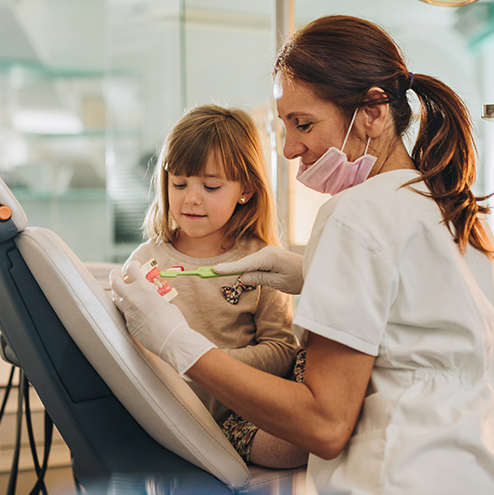Special Needs Dentist in Oak Park, IL
Petite Smiles Pediatric Dentistry is proud to offer exceptional dental care for patients with special needs. If your child needs some additional accommodations during their appointments, please get in touch with our friendly front office team, and we’ll be glad to make modifications to their treatment plan. If there’s anything else we can do to make your visits better, all you have to do is ask!
Contact UsHow can I prepare my special needs child for their dental visit?
Preparing a special needs patient for a dentist appointment involves familiarizing them with the process in a gentle and reassuring way. Start by explaining what will happen during the visit using simple language or visual aids. Have them practice sitting in a chair and opening their mouth at home to mimic a dental exam. Reading books or watching videos about dental visits can also help. Additionally, you’re welcome to visit our office beforehand to meet the staff and allow your child to assess the office environment, which can reduce anxiety on the day of the appointment.

What should I tell the dentist about my special needs child before their visit?
Before their first visit, we’d love to know more about your child’s specific needs, including any medical conditions, sensory sensitivities, communication challenges, and preferred comfort items or routines. Share any pertinent details about past dental experiences, both positive and negative, to help our staff understand potential triggers and best approaches. Providing this information allows Dr. Murphy to tailor the visit to your child’s needs, ensuring a more comfortable and supportive experience.

Can dental sedation be used to help my child during their dental appointments?
Nitrous oxide (laughing gas) and IV sedation can significantly ease dental visits for special needs patients by reducing anxiety and discomfort. Nitrous oxide is a mild sedative that helps patients relax while staying awake and responsive. It is inhaled through a mask and wears off quickly after the procedure. IV sedation offers deeper relaxation and is often used for more extensive procedures or when a child has severe anxiety or difficulty cooperating. Both options can be utilized for a smoother, less stressful dental experience, helping ensure necessary dental care is provided.

What conditions may require a special needs dentist?
Patients with physical, developmental, behavioral, or medical conditions may benefit from care with a special needs dentist. This can include autism spectrum disorder, Down syndrome, cerebral palsy, ADHD, anxiety disorders, or complex medical conditions that affect oral health or cooperation during visits. These patients often need extra time, clear communication, and a gentle approach to ensure they feel comfortable and receive safe, effective dental care.
How are pediatric dentists equipped to cater to patients with special needs?
Pediatric dentists receive specialized training to care for children with a wide range of needs. Our team is experienced in behavior guidance techniques, sensory-friendly approaches, and clear, simple explanations. We can adjust appointment length, environment, and treatment plans to fit each child. This helps reduce stress, build trust, and make dental visits more positive for both the child and their caregiver.
Can adult patients with special needs see Dr. Murphy?
As young patients with special needs grow into adulthood, they are welcome to continue seeing Dr. Murphy. Our office understands that dental needs do not end at childhood, and many adults require the same patience and personalized care. Dr. Murphy takes the time to understand each patient’s medical history, comfort level, and concerns to provide respectful, thorough dental care in a supportive setting.

